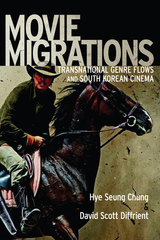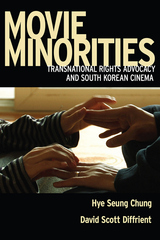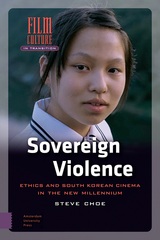3 books about South Korean Cinema

Movie Migrations
Transnational Genre Flows and South Korean Cinema
Hye Seung Chung and David Scott Diffrient
Rutgers University Press, 2015
As the two billion YouTube views for “Gangnam Style” would indicate, South Korean popular culture has begun to enjoy new prominence on the global stage. Yet, as this timely new study reveals, the nation’s film industry has long been a hub for transnational exchange, producing movies that put a unique spin on familiar genres, while influencing world cinema from Hollywood to Bollywood.
Movie Migrations is not only an introduction to one of the world’s most vibrant national cinemas, but also a provocative call to reimagine the very concepts of “national cinemas” and “film genre.” Challenging traditional critical assumptions that place Hollywood at the center of genre production, Hye Seung Chung and David Scott Diffrient bring South Korean cinema to the forefront of recent and ongoing debates about globalization and transnationalism. In each chapter they track a different way that South Korean filmmakers have adapted material from foreign sources, resulting in everything from the Manchurian Western to The Host’s reinvention of the Godzilla mythos.
Spanning a wide range of genres, the book introduces readers to classics from the 1950s and 1960s Golden Age of South Korean cinema, while offering fresh perspectives on recent favorites like Oldboy and Thirst. Perfect not only for fans of Korean film, but for anyone curious about media in an era of globalization, Movie Migrations will give readers a new appreciation for the creative act of cross-cultural adaptation.
[more]

Movie Minorities
Transnational Rights Advocacy and South Korean Cinema
Hye Seung Chung and David Scott Diffrient
Rutgers University Press, 2021
Rights advocacy has become a prominent facet of South Korea’s increasingly transnational motion picture output, especially following the 1998 presidential inauguration of Kim Dae-jung, a former political prisoner and victim of human rights abuses who received the Nobel Peace Prize in 2000. Today it is not unusual to see a big-budget production about the pursuit of social justice or the protection of civil liberties contending for the top spot at the box office. With that cultural shift has come a diversification of film subjects, which range from undocumented workers’ rights to the sexual harassment experienced by women to high-school bullying to the struggles among people with disabilities to gain inclusion within a society that has transformed significantly since winning democratic freedoms three decades ago. Combining in-depth textual analyses of films such as Bleak Night, Okja, Planet of Snail, Repatriation, and Silenced with broader historical contextualization, Movie Minorities offers the first English-language study of South Korean cinema’s role in helping to galvanize activist social movements across several identity-based categories.
[more]

Sovereign Violence
Ethics and South Korean Cinema in the New Millennium
Steve Choe
Amsterdam University Press, 2016
South Korea is home to one of the most vibrant film industries in the world today, producing movies for a strong domestic market that are also drawing the attention of audiences worldwide. This book presents a comprehensive analysis of some of the most well-known and incendiary South Korean films of the millennial decade from nine major directors. Building his analysis on contemporary film theory and philosophy, as well as interviews and other primary sources, Steve Choe makes a case that these often violent films pose urgent ethical dilemmas central to life in the age of neoliberal globalization.
[more]
READERS
Browse our collection.
PUBLISHERS
See BiblioVault's publisher services.
STUDENT SERVICES
Files for college accessibility offices.
UChicago Accessibility Resources
home | accessibility | search | about | contact us
BiblioVault ® 2001 - 2024
The University of Chicago Press









